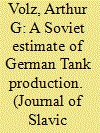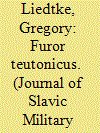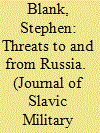| Srl | Item |
| 1 |
ID:
084728


|
|
|
| 2 |
ID:
084727


|
|
|
|
|
| Publication |
2008.
|
| Summary/Abstract |
This article examines the notion that the Battle of Kursk represented the end of German offensive operations on the Eastern Front, and that henceforth the German Army was solely tied to the defensive. Focusing upon the strength of the German formations involved, it outlines a number of the dozens of German offensives and counter-attacks that occurred during the period of 1943-1945. The article concludes that the German Army retained its offensive capabilities till the end of the war and that its operations played a significant, but frequently forgotten, role in shaping the Russo-German conflict.
|
|
|
|
|
|
|
|
|
|
|
|
|
|
|
|
| 3 |
ID:
084725


|
|
|
|
|
| Publication |
2008.
|
| Summary/Abstract |
This article considers two perspectives of the post-Communist European integration movement. One perspective addresses rational choice economics in driving support for both the European Union, a low politics organization that emphasizes trade and social policies and NATO, a high politics defense organization. The other perspective addresses the impact that languages and ethnicity have, two factors derived from Anderson's notion of an imagined community. These two perspectives exhibit differences on how voters perceive and endorse integration in three societies in three different parts of the former Warsaw Pact. In those societies that are more ethnically and linguistically heterogeneous such as Bulgaria and Latvia, there is greater variation in backing endorsement for Western Europe from 1997 through 2004 than in societies that are more homogeneous such as Poland.
|
|
|
|
|
|
|
|
|
|
|
|
|
|
|
|
| 4 |
ID:
084723


|
|
|
|
|
| Publication |
2008.
|
| Summary/Abstract |
This article discusses the central features of the evolving relationship between the defence industry and the state in Russia in light of the military procurement program for the 2007-2015 period. Given the extent of changes affecting the defence industrial sector, and the amount of extra-budgetary funding dedicated to military procurement, the Russian government's efforts seem primarily geared toward rejuvenating the defence industry, and only secondarily toward fulfilling the imminent needs of the armed forces. According to the author, if these efforts lead to an improved performance of the Russian defence industry, the Russian armed forces could be able to acquire significant numbers of advanced weaponry within the next 10 years.
|
|
|
|
|
|
|
|
|
|
|
|
|
|
|
|
| 5 |
ID:
084719


|
|
|
|
|
| Publication |
2008.
|
| Summary/Abstract |
Under conditions of visibly deteriorating Russo-American and East-West relations it is necessary to outline clearly the threats perceived by Russia from Western and U.S. policies, and second, the threats that Russia may pose in return. An analysis of such threats reveals that the balance of threat perception is asymmetrically weighted to the Russian side which perceived threats everywhere, i.e., from within and without. This underscores the fact that the baseline of Russian foreign and defense policy is the presupposition of threat, and a pervasive one at that. Second, these threats are largely perceived in terms of a classical hard power Realpolitik even if Moscow's instruments for countering them are largely nuclear weapons and its energy capabilities. Third, Russia's threat perception is extensively tied to the fear of information warfare as a tool for unhinging the entire society and state. Correspondingly, this potential, in Russia's hands, as well as its efforts to use its economic power and accompanying political instruments, are becoming the pivot of foreign perceptions of a threat originating from Russia. Finally, there is a real danger that the United States and Russia will increasingly come to see each other's military, and/or especially nuclear or missile defense forces as threats that, under conditions of ideological and political contestation, justify a new arms race.
|
|
|
|
|
|
|
|
|
|
|
|
|
|
|
|